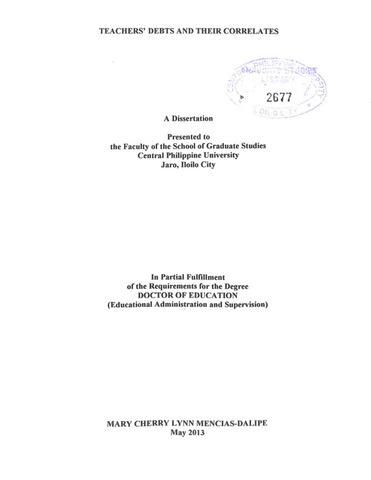Teachers' debts and their correlates

Page views
5,280Petsa
2013May-akda
Tagapayo ng Tesis
Tagapangulo ng Panel ng Depensa
Magbahagi
Metadata
Ipakita ang buong tala ng item
Abstract
The study aims to determine the correlates of debts of the 276 out of the 982 regular permanent teachers of the 68 public secondary schools in the Division of Aklan. In identifying the respondents, Exclusion Criteria was employed, that only those with access to loans and admitted that they have the opportunity to avail of loans were included in the study. Data were gathered from July 2012 to November 2012 using researcher-made questionnaire backed-up with the conduct of Focus Group Discussions. Data were processed using the Statistical Package for Social Sciences (SPSS) version 20 software.
Study shows that secondary school teachers are middle-aged; majority are female; married; and have units in Master’s degree in Education. Almost half of them occupy Teacher I position and had been teaching for less than ten years. They belong to nuclear type of family with six members; two of which are their children who are still minors and studying. The monthly income and expenditure of the teachers and their family was higher than the reported average family income and expenditure in Aklan but the difference between the family income and expenditure is very small; hence, most of the teachers have no savings. Bigger proportion of their budget was allocated for food, household expenses, baby needs, education, health and medical expenses and transportation. Spending for recreation and entertainment was the least.
Majority of the respondents have high awareness of the conditions of various government and private lending institutions. Level of awareness increased with length of teaching experience and promotion to higher position. Most of the teachers manifested favorable attitude towards spending, debt acquisition, and debt management (payment, reduction, or avoidance). Teachers with less family responsibility and better career status have more favorable attitude while those with longer tenure have less favorable attitude. Respondents availed loans from GSIS, PAG-IBIG, banks, cooperatives, and even from other private lending agencies. Almost one-half of their gross income or around Php10,000.00 per month was used to pay their debts.
Middle-aged teachers have relatively lower family expenses compared to younger and older ones. Teachers with bigger household and family income have higher the family expenditure. The bigger their household size, the higher the expenditure. The higher the family income, the bigger the expenditure since their lifestyle adjusts with income. Younger; married teachers; those occupying higher position and have longer tenure have higher cumulative debts.
Younger teachers, especially males and single; those with higher position and longer teaching experience; higher salary and family income; smaller household size; and less number of children have more favorable attitude towards spending. Demographic and economic characteristics of the teachers have no significant influence on their attitude towards debt acquisition. Younger respondents and those belonging to smaller household and nuclear type of family have more favorable attitude towards debt payment, reduction, and avoidance. Teachers with longer tenure; lesser income and are sole breadwinners showed less favorable attitude towards debt payment, reduction, and avoidance.
Awareness and attitude towards spending, debt acquisition, and debt management have no influence on the amount of monthly expenditure and cumulative debts of the teachers. Teachers with higher expenditure were found to have higher debts. The Theory of Reasoned Action (TRA) and Theory of Planned Behavior (TPB) explain that those who spend more and beyond their means were aware that they need to borrow money in order to cover up their expenses. They allowed higher expenses because they know that acquiring loans or having debts, bridge the gap between their income and expenditure.
Major purposes of having debts are for education and professional growth; illness and death; and house construction and repair. Before acquiring loans, teachers looked on to the interest rate; duration or length of payment; and their capability to pay. They consider high interest rate, low take-home pay and having overlapping debts as major problems when they have higher loans. To avoid being indebted, teachers believe that they must have sound financial management; higher salary; and appropriate, economic, and healthy lifestyle. Teachers prefer to borrow money from family members and relatives; then to GSIS, PAG-IBIG, or other accredited banks and cooperatives. When left with no other choice, they also avail loans from friends and co-workers or pawn their jewelleries and entrust their ATM card to “loan sharks”.
It is then recommended that teachers must be taught how to prepare strict monthly budget plan and should attend seminars on Employee Welfare and Benefits, with special emphasis on loans; and be re-oriented with what is stipulated in the Code of Conduct of Professional Teachers focusing on maintaining good reputation with respect to financial matters such as in the settlement of debts and loans and in arranging private financial affairs. Lectures on Money and Debt Management and Lending Agency Awareness is helpful to teachers for them to develop spending and saving plan based on their situation, resources, and goals.
Educational Budget Planners must consider providing teachers additional fringe benefits such as free medical care and subsidized child education. Some benefits like medical care cover not only the teachers themselves but also their family members including their parents. This will lessen their expenditure for health and education. Schools should also consider setting-up school cooperatives where teachers can invest and earn additional income. Full implementation of the Salary Standardization Law which stipulate the elevation of the salary of teachers from Grade 11 (Teacher I) that is Php 18,549.00 per month to Grade 20 which is Php36,567.00 per month, will improve the economic status of the teachers.
Paglalarawan
Abstract only
Mungkahing Sipi
Dalipe, C. L. M. (2013). Teachers' debts and their correlates (Unpublished doctoral dissertation). Central Philippine University, Jaro, Iloilo City.
Uri
DissertationKagawaran
School of Graduate StudiesDegree
Doctor of Education major in Educational Administration and SupervisionLokasyon ng Istante
GSL Theses 378.242 D159
Pisikal na paglalarawan
xiii, 210 leaves

